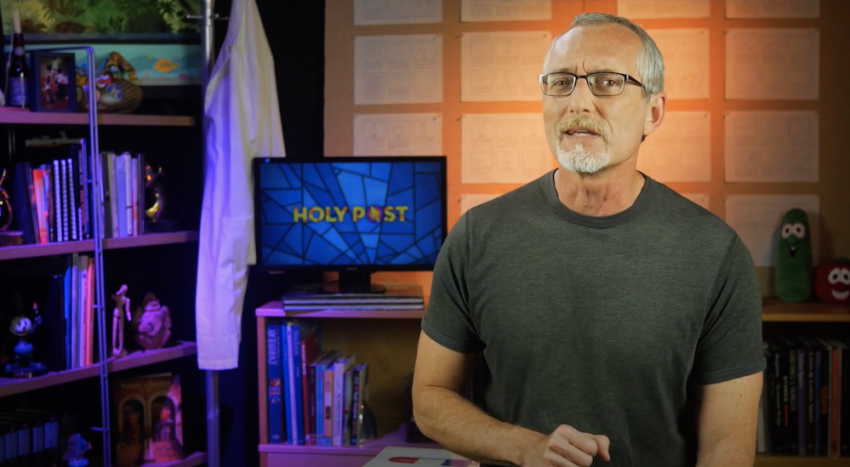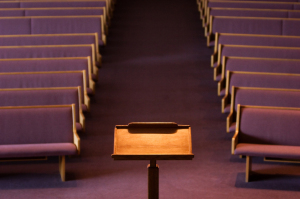‘VeggieTales’ creator releases new video on race in America, answers 4 looming questions

Phil Vischer, creator of the popular Christian animation "VeggieTales" and voice of Bob the Tomato, has been actively using his platform to address racial issues. The animator recently released another video responding to questions he’s received from white viewers about race in America.
Following the police-involved death of George Floyd, many Americans have been discussing issues pertaining to race and the debate around systemic institutionalized racism. Vischer’s first “Race in America” video amassed over 1.2 million views on YouTube alone.
This month, Vischer released part 2, where he lists four questions people have frequently asked him:
“Number one, What about the black family? Too many black families have no fathers. Why didn't you talk about that?
Number two, what about the welfare state, the war on poverty? Didn't the welfare programs of the 1960s do serious damage to black communities?
Number three, why do you say we did this? I didn't do any of this stuff.
Number four, beyond caring? What can we actually do?”
The Holy Post host began by answering each question in sequential order. First, he briefly discussed the late Sen. Daniel Patrick Moynihan's 1965 report, “The Negro Family: The Case for National Action” and then-President Lyndon Johnson's war on poverty programs. The Moynihan report included a statistic that said 25% of black babies were born to unwed mothers, whereas nonmarital births for white mothers was less than 5%.
Moynihan argued that there was a crisis in black families that required intervention on a national scale. But the report was rejected at the time because it “sounded like Moynihan was blaming the victim,” Vischer said.
Twenty-one years later, in 1986, The Washington Post declared that “Moynihan was right.”
In the video, Vischer maintained: "Intact families with two involved parents are hugely beneficial to kids. The collapse of marriage is, in fact, a really big deal. Traditional two-parent families are not in crisis only in black communities. They're in crisis everywhere.”
"So what do we learn from this? Upper class and upper-middle-class Americans still value marriage, regardless of race. It is in the working class, especially the working poor, where the institution of marriage is collapsing,” he continued. “But why are the overall numbers so much worse in African American communities? Because African Americans are two-and-a-half times more likely to be living in poverty than white Americans.”
Vischer said African American communities started the nonmarital birth rate at a much higher rate since 1965, but now that has been growing at a faster rate among white Americans than among black Americans.
"Marriage isn't collapsing in black America. It's collapsing in working-class America,” he declared.
He went on to say that one of the major factors of poverty is that working-class men no longer have access to the jobs their fathers once had because the jobs have moved online or overseas.
"Pretty soon their little boys [are] growing up in these communities with zero memory of a time when men went to work with their hands and came home and built families. The chain is broken, the institutional knowledge of marriage and family is lost," Vischer lamented.
"This is an incredibly hard problem to address. And today, it is becoming as big an issue in working-class white communities as it has been for several generations in working-class black communities. Without the hope of being able to support a family, men give up on the idea of fatherhood and families collapse," he added.
The cartoon creator who also serves as a church leader insisted that there's nothing unique about the breakdown of the family in African American communities. He believes the breakdown stems from the treatment the black community has received since the inception of America. He said both African Americans and Native Americans have had similar experiences.
"Think about it, these are the only two groups of people that weren't given a choice whether or not to live in white America; the only two groups that have been actively and consistently treated unjustly by European settlers since before there even was an America. And today, they are the two groups whose communities are marked the most by poverty, unemployment and addiction. Is it just a coincidence that we see the most dramatic breakdown of family structure in the two communities that have faced the most historic injustice?” Vischer asserted.
"The root of the problem isn't irresponsibility. The root of the problem is that we have millions of men who do not believe they can do what their fathers and grandfathers did: go to work, bring home a paycheck, support a family,” he continued. “The root of the problem isn't a loss of responsibility. It's a loss of hope. Children need dads and dads need to believe they live in a society where it is possible for them to succeed.”
When answering the second question, Vischer maintained that the notion that inner-city African American communities were doing just fine until the government came along and messed everything up “is entirely false.”
"We forget sometimes that when Johnson launched the war on poverty, the majority of impoverished Americans were white. The majority of the money spent on benefits to the poor went to white families, typically rural white families.” He said. “Yet today, when we think of welfare, we think almost exclusively of black families in urban America.”
He then posited why that would be the case and said: because “poverty in America isn't a uniquely black problem.”
Vischer resolved that African American families make up less than 30% of America's poor and receive about a third of government spending on poverty programs. He said 70% of the spending “goes to white and Latino families.”
He blamed the media for promoting news images of black people to portray poverty.
“Here's the sad reality of lingering racism in America. The more we think of poverty as a black problem, the less we want to help. It isn't us after all, it's them,” he quipped.
Vischer then responded to the third question he's often asked by others in the white community, which is: Why should they apologize for something that happened generations ago?
Vischer responded: "We love to take collective ownership for the great things America has done and then completely reject any ownership of the terrible things America has done. The Bible talks about individual sin and individual repentance as highly individualistic. The Bible also talks about societal sin and societal repentance multiple times.”
“In the Old Testament, we see all of Israel, the people of God, called to repent for sins, they did not all commit. In Daniel 9 we see Daniel repenting for the sins of his forefathers, sins he did not commit. In Nehemiah 1 we see Nehemiah doing the exact same thing.” he added.
America is good and bad, virtuous and sinful, selfless and selfish. Why? Because America is us, and we are all those things, I am all those things. Let's own the problem together. That's how America has always accomplished big things.”
Vischer ended the video by providing practical things people can do to help bring forth racial equality. He listed free preschool, education funding, and supporting efforts to train more African American teachers to rid educational bias as well as providing mentors for impoverished children.
He said whites are not to help as “saviors” but rather as “allies.”
“A home and education and opportunity changes the course of a family. Change the course of enough families and you can change the course of a community,” Vischer maintained.
Vischer concluded: “Families are in trouble not just in black America, in all of America, especially among the working class. This is an extraordinarily difficult problem to address. But there are churches and ministries trying to do just that. We need to support them. The welfare programs of the 1960s had some unintended consequences, but they did not create the problems we see today. Let's not use that as an excuse to not help.
"I say we did this because those of us in the majority have been in the majority since the very beginning. The policies that created inequality came from the majority and any big changes needed to address that inequality will need the support of the majority. That's us. And finally, you can do things to help big things, little things. The impact of historic racism still echoes in America harming millions of lives. It is a problem. Let's make it our problem and let's do something about it!”



























